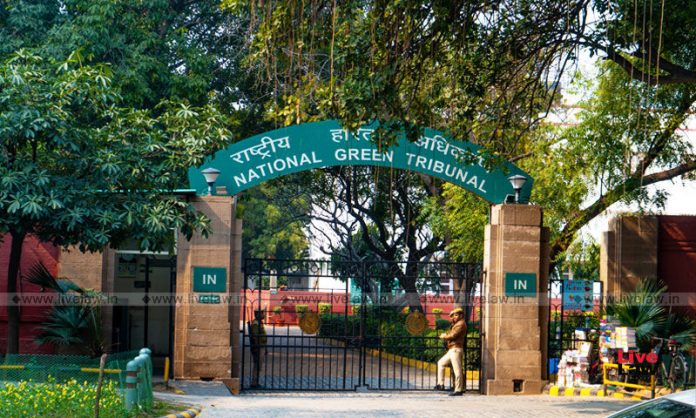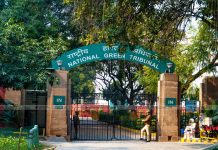This article is written by Niharika Agrawal, from IFIM Law School. This article deals with the analysis of the case that contains the issue of whether NGT has the jurisdiction to take Suo moto cognizance without an application.
Table of Contents
Introduction
National Green Tribunal (NGT) is the specialized body that is regulated by the National Green Tribunal Act, 2010 for effective and expeditious disposal of cases relating to environmental protection and conservation of forests and other natural resources. India is the third country globally and the first developing country that has successfully established a specialized environmental tribunal. Its composition includes the chairperson, the judicial members and the expert members for the term of five years who are not eligible to reappointment. It has the jurisdiction of all the civil cases that involve substantial questions relating to the environment and also enforcement of any legal rights based on the environment. It also has the appellate jurisdiction to hear appeals as a court by being one of the statutory-like courts.
Recently the question regarding the scope of its jurisdiction has been observed by the Supreme Court while dealing with SLP in the pending case of Municipal Corporation of GR. Mumbai v. Ankita Sinha (2018). The issue that the Supreme Court was examining was whether the NGT has the jurisdiction to take suo moto cognizance without any formal application. This article comprises various observations made by the lawyers in the above case.
Analysis of the origin of the case
The origin of the above case is from the judgment given in the case of Ankita Sinha v. the State of Maharashtra (2018) where the Principal Bench, pursuing an article titled “Garbage Gangs of Deonar: The Kingpins and Their Multi-Crore Trade” that had taken cognizance of the same and treated the same as the application under Section 14 of the NGT Act. The article contended that there was illegal disposal of waste from the dumping zones of the garbage at Deonar in Mumbai. Such unauthorized activities are carried out for profiteering which resulted in massive fires that may further adversely affect the environment, health, and the lives of inhabitants. This also caused a huge violation of several legislations related to environmental issues such as the Air (Prevention and Control of Pollution) Act, 1981, Water (Prevention and Control of Pollution), Act 1974, Solid Waste Management Rules, 2016 and the Hazardous Waste Management Rules, 2016.
The Central Pollution Control Board and Maharashtra Pollution Control Board were directed to conduct joint inspection along with collectors of the areas, and the representatives of the Municipal Corporation Greater, Mumbai. It was also directed to prepare some action plans for remediation of legacy waste and form a report on the steps taken. The report of the joint inspection also observed that there was a huge amount of legacy waste and fire accidents taking place that caused huge air pollution which led to the failure of the Municipal Corporation Greater Mumbai. Such damage to public health was self-evident and has caused huge destruction of the environment and violation of the law. Hence, the Municipal Corporation Greater Mumbai was asked to compensate Rs. 5 cr by way of deposit with the Central Pollution Control Board within one month for environment restitution. Such amount could also be recovered from the polluters or the erring officers as they failed to adhere to the time-line for taking follow-up environment rectification and the rule of law that is necessary for the protection of the environment, for which Municipal Corporation is put to terms by directing the Municipal Corporation, Greater Mumbai to furnish a performance guaranteed to the satisfaction of CPCB in the sum of Rs. 100 crore.
This impugned order of the NGT was kept on stay by the Supreme Court in 2019. Along with the leading case of Municipal Corporation of GR. Mumbai v. Ankita Sinha (2018) and other certain petitions were filed against NGT. Senior Advocates Krishnan Venugopal and V Giri mentioned those appeals before the bench. The bench then agreed to consider all the matters along with the lead matter on 25th Aug 2018.
Hearings in the tribunal
The tribunal, in the case of Municipal Corporation of GR. Mumbai v. Ankita Sinha, asked a bench consisting of Justice A. M. Khanwilkar and Sanjiv Khanna, who was hearing the series of special leave petitions and appeals to address the issue regarding the ability of jurisdiction of the NGT to exercise suo moto cognizance without application just like constitutional courts.
While analyzing this issue, Senior Adv. A.N.S Nadkarni pointed out to the bench that the NGT is one such authority that needs an applicant or a claimant before it can take cognizance of an issue. It cannot exercise like constitutional courts where the proceedings can be commenced of its own accord. He contended that this authority under the NGT Act requires the existence of a ‘lis’ between two parties in a dispute where one party is demanding something and the other party is denying it. This is the major difference between the tribunal and the courts or else the tribunal will also be a civil court. This also applies in the Administrative Tribunals and other tribunals. The jurisdiction of NGT under the Act does not have the same power as the constitutional jurisdiction under Article 32 and Article 226 of the Indian Constitution.
To support his contentions, he referred to the decision given by the Supreme Court in the case of Techi Tagi Tara v. Rajendra Singh Bhandari (2017), which observed that all the provisions of the Act read together clarifies that there must be one substantial question relating to the environment and that the question should arise in a dispute and should not be an academic question. It was also held that it is mandatory to have a claimant raising such dispute which is capable of settlement by the NGT through availing some relief that could be either in nature of compensation or restitution of damaged property or restitution of the environment or any other incidental or ancillary relief related to the same.
Remarking on the contention made by Adv. Nadkarni, Justice Khanwilkar stated that the above wordings are not a statement of law or a binding precedent and it might be just a passing remark. He pointed to Section 14 of the Act which defines the jurisdiction of the tribunal and observes that jurisdiction of the tribunal cannot take the issue only on the filling of the original formal application but instead, under Section 14 (1), the tribunal can exercise the jurisdiction of all nature of civil cases where a substantial question relating to the environment along with enforcement of all the other legal rights are related to the environment. These substantial questions arise out of the implementation of the enactments specified in the Schedule.
Schedule I specifies the implementation of enactments. According to this, the tribunal can in any way exercise all those powers which are conferred on it under the statutes and also the acts in the Schedule. Justice Khanwilkar pointed out that there is no such precedent or judgment that held that the NGT does not have suo moto power to look into environmental problems and issues without the prior filing of applications. He further reflected on the possibility of having suo moto powers to the NGT and showed his concern towards considering the purpose and intention of the NGT Act.
He further replied on the contentions of Nadkarni that the other tribunals mentioned by him are related to the dispute between the government and government servants or the government servants inter se. In this case, the tribunal is concerned about the common man who has been the victim of pollution. With this, he also stated the possibility of various reasons due to which applications may not be filed.
Further, Justice Khanna stated that the tribunal plays a wide and significant role. It would be wrong to say that the NGT does not have suo moto jurisdiction as that might be tantamount to curtailing the powers of the tribunal. To save the powers of the tribunal, it is important to analyze the nature and the functions of the tribunal, the powers that are conferred on it, and the duties that lie upon the tribunals. He also pointed out Section 14(1) that nowhere includes or talks about applicants. Some later provisions in the Act observe the possibility of the presence of the applicant. According to the interpretation of Justice Khanna, there is nothing in the Act to suggest that the jurisdiction of the NGT cannot be practiced without applicants. He also explained the scope of jurisdiction that is indicated under Section 15 (1)(a) of the Act which allows the tribunal to grant relief, compensation, and restitution to the victims of pollution and through other damages caused due to the environment. He lastly clarified that it is available to the ‘victims of pollution’ and not to the ‘applicants’. The case is still pending before the honorable Supreme Court.
Conclusion
The issue in the above case is yet to be examined by the Supreme Court of India. However various senior experts, as well as the judges, believe that NGT has the jurisdiction to take suo moto cognizance without any formal application as it is important to protect the environment and the victims of pollution. It is, in the end, important to save the environment from all the hazardous pollution and other elements that affect the country as well.
Reference
- https://www.drishtiias.com/important-institutions/drishti-specials-important-institutions-national-institutions/national-green-tribunal-ngt
- https://www.sify.com/news/sc-to-examine-if-ngt-has-power-to-take-up-matters-on-its-own-news-national-vierkujccffdd.html
- https://www.casemine.com/judgement/in/5dcdb36f46571b625cada0fb
- https://www.livelaw.in/top-stories/supreme-court-to-examine-on-25th-august-ngt-jurisdiction-to-take-suo-moto-cognisance-without-application-178865#:~:text=Supreme%20Court%20To%20Examine,-Mehal%20Jain&text=The%20Supreme%20Court%20shall%20consider,to%20take%20suo%20motu%20proceedings.&text=It%20cannot%2C%20like%20a%20constitutional,proceedings%20of%20its%20own%20accord.
Students of Lawsikho courses regularly produce writing assignments and work on practical exercises as a part of their coursework and develop themselves in real-life practical skills.
LawSikho has created a telegram group for exchanging legal knowledge, referrals, and various opportunities. You can click on this link and join:
https://t.me/joinchat/J_0YrBa4IBSHdpuTfQO_sA
Follow us on Instagram and subscribe to our YouTube channel for more amazing legal content.
 Serato DJ Crack 2025Serato DJ PRO Crack
Serato DJ Crack 2025Serato DJ PRO Crack











 Allow notifications
Allow notifications


